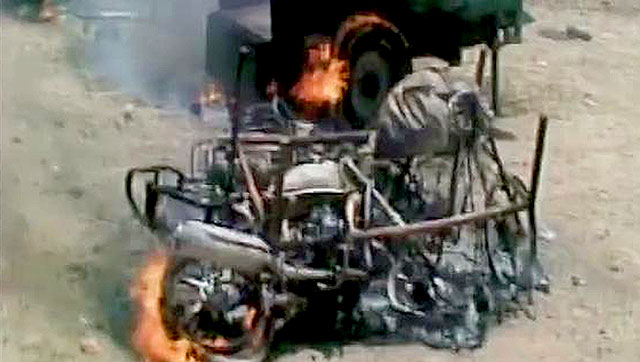Rajasthan: The New Killing Field Of Dalits
By Samar
16 May, 2015
Countercurrents.org

How many Dalits must be killed till government knows
That too many Dalits have been killed?
The answer my friend is blowin' in the wind
The answer is blowin' in the wind.(With no apologies from lyricists Billy Sherrill, Charlie Rich and singer Bob Dylan)
Outraged, angry or dejected, how should one react to the most recent case of brutal killing of Dalits in Nagaur district Rajasthan? Most recent, because it was not the first one and howsoeve much one would want otherwise, this would not be the last one. The ones crushed to death by tractors of the so called upper caste were not the first one to die, the ‘upper caste’ people have set a Dalit family on fire on 18 February this year as well and thus burnt an elderly woman alive. (You can find the details here). Incidentally, that murder too was committed over a land dispute.
Why do land disputes involving Dalits often end up in ‘upper castes’ mobilised murders unlike those among the upper caste that run for decades in courts? What is in them that makes them so different from other, and ‘regular’, disputes over property?
They are different because they mark that assertiveness of erstwhile depressed castes which offers biggest challenge to casteism, the basic tenet that keeps Indian Feudalism up and kicking. They mark a defiance of millennia long malice that has kept the caste based hierarchies intact by the victims of the system. They challenge the feudal values on which the facade of a modern and democratic India is superimposed upon. Bet that the perpetrators, in this case, would not have crushed the Dalits in a fit of rage. They would not in any such case. Their rage would never be spontaneous. it would not emanate from a mere personal enmity over property.
Why, on the earth, a whole caste attack another over a dispute between two families, after all? The source of this anger is much deeper. It arises from the anger against those trying to escape from the dehumanised existence they have been condemned to for centuries. Bet that it is provocation enough for the ‘upper castes’.
Let us come back to most recent murders in Rajasthan and ask why none but one of the murderers have been apprehended till now? The question might get partially answered by Rajasthan Home Minister Gulab Chand Katariya’s response that the government doesn't have a "magic wand" to arrest the culprits immediately. Yet, it would not be a complete answer as the Minister forgets, happily, to tell that the murderers of the elderly Dalit woman in the same district are still roaming free despite a massive protest with, allegedly, ample support of his government.
The real answer lies in the fact, again, that Indian democracy, like Indian modernity, is a strange creature superimposed upon the regressive structure of caste. Arresting the murderers from the dominant caste, the basic support base, of the ruling political party, would upset their electoral equations and which party in its senses wants to take that chance? More so, when the ruling party is Bhartiya Janata Party that champions Hindutva whose existence itself depends on the same regressive structure?
Unfortunately, these murders would not be the last one either as Rajasthan has the dubious distinction of being one of the worst states of India when it comes to atrocities committed against Dalits. With 6,475 cases in 2013, the state ranks third in the data released by the National Crimes Record Bureau (NCRB).
The real travesty of justice lies here. These murders are not just one among thousands of such cases tucked away in the yellowing pages of the annual reports issued by the National Crime Records Bureau. They, in essence, are the confession of the fact that India is at war with itself. They betray the fact that the biggest internal or existential threat to India does not come from Maoists, Jihadists or whatsoever name the then regime might be fancying with at that point of time. They prove beyond doubt that it comes from country’s inability to take on the biggest demon eating it from within, the demon of caste.
The very basic point of existence of a modern democracy is enforcing rule of law, something India has traded off with enforcing law and order. The difference between the two is the difference between a republic respecting all its citizens with equal rights and a colonial state keeping its subjects in check. We had half lost the battle for long, losing the second half remains just a matter of time with the ascendence of Hindutva forces.
I am not expecting any justice for the victims of Nagaur in Rajasthan, the new killing fields of Dalits because I saw none happening for the victims of Bhagana in Harayana, Ahmadnagar in Maharashtra, and so on. I am not expecting any because I saw politicians including ‘honourable’ Member of Parliament falling head over heels to support Khap Panchayats accused of honour killings. The murderers know that not merely the power dynamics but the powers that may are with them. They would keep killing with impunity till they know that the long arm of the law will eventually catch up with them. I do not see that happening anytime soon.
Irrespective of how many Dalits have been killed, the numbers would never be enough for the governments we elect.
Samar is Programme Coordinator - Right to Food Programme Asian Legal Resource Centre / Asian Human Rights Commission, Hong Kong
Tags
.
Comments are moderated

